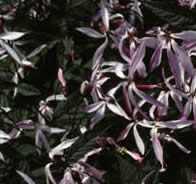|
How Do You Make a Garden Grow?
Plant Wildflower Clones All in a Row
NORTHAMPTON, Mass. – When nature did not spread a rare new wildflower, Smith College researchers took to the lab to accelerate the process of making it available to local gardeners as an alternative to non-native competitors.
 For centuries, travelers have introduced showy new plants from around the world into this country. The non-native species tend to overshadow the local mix and – looks aside – threaten the native species by taking their moisture, sunlight, nutrients and space. For centuries, travelers have introduced showy new plants from around the world into this country. The non-native species tend to overshadow the local mix and – looks aside – threaten the native species by taking their moisture, sunlight, nutrients and space.
So, a Smith research team recently embraced the difficult case of the Pink Profusion Porteranthus, a native flower that had not been successfully cultivated during the two decades since its single seedling was discovered in the wild.
With its showy pink flowers, purple stems and reddish leaves, it looked like a flashier version of a white-flowered selection of the species that is common in woodlands. But, leaving it to nature to spread this pink version of the wildflower had not worked; it was too slow to multiply and its seedlings always developed the common white flowers.
“In the plant world, 'cloning' is essentially done every time a gardener takes a cutting off a plant to start another plant,” said Michael Marcotrigiano, director of the Botanic Garden, who conducted the research with graduate student Arianna Bruno ‘05. "When that method didn't work for the Pink Profusion, we essentially did the same thing in the controlled environment of the lab."
Working with the Mt. Cuba Center, Inc., in Delaware, an organization that promotes the conservation of native plants by encouraging their use in public and private landscaping, the Smith team obtained some cuttings of the Pink Profusion cultivated from the original seedling.
Using a method called "tissue culture," the Smith team successfully propagated shoots that grew into plants with pink flowers. Their work resulted in a paper in the journal Plant Cell Tissue and Organ Culture, which describes a three-step process to multiply the Pink Profusion in a way that will make it available commercially.
As part of their agreement with Mt. Cuba Center, Inc., which supported the research, the team shared that method with a company that now plans to use it to multiply and supply the desirable Pink Profusion to garden centers.
“Attractive selections of native plants such as Pink Profusion may create greater appreciation for native species and lessen the desire for exotic species,” said Marcotrigiano.
But, gardeners need not purchase a cloning kit at the local gardening center. When the Pink Profusion arrives on the market in a year or so, it will be full-grown and showing its vibrant colors, according to Marcotrigiano.
-30-
|

|
 |

|
|
Office of College
Relations
Smith College
Garrison Hall
Northampton, Massachusetts 01063 |
 |
Kristen Cole
Media Relations Director
T (413) 585-2190
F (413) 585-2174
kacole@email.smith.edu
|
|























